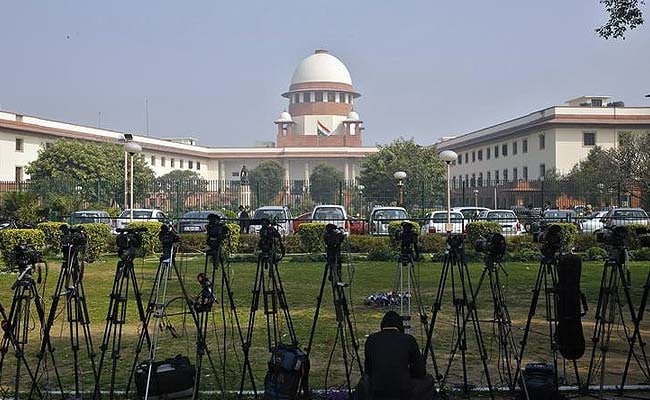
File Photo: Supreme Court of India
New Delhi:
The Centre on Wednesday told the Supreme Court that a "fool proof" system would be in place for the implementation of the Aadhaar scheme and Right to Privacy cannot be invoked to scrap the welfare programme as it is not a fundamental right under the constitution.
"Right to Privacy is not a fundamental right under our Constitution. It flows from one right to another right. Constitution makers did not intend to make right to privacy a fundamental right."
"There is no fundamental right to privacy so these petitions under Article 32 should be dismissed," Attorney General Mukul Rohatgi submitted before a bench headed by Justice J Chelameswar which during the hearing said, "We are inclined to refer it to the larger Constitution bench".
He was countering the contention that the Aadhar scheme based on collecting personal data violates the citizens Right to Privacy.
"What is the contour and what is the interplay of various rights required to be ascertained," he said, adding that "Right to Privacy is not absolute and is subject to restrictions."
The Attorney General said the plea for scrapping the scheme cannot be allowed.
"We are formulating a fool proof system," he submitted before the bench, also comprising Justice SA Bobde and C Nagappan, which asked "would a person bargain his fundamental right to privacy to get a fundamental right of food".
"If a court comes to the conclusion that the right to privacy is a fundamental right then you cannot waive it," the bench observed while the Attorney General said if such issues are arising in the matter then "why can't it be referred to a larger bench".
The Attorney General said there is a "clear divergence of opinion" on the right to privacy and "a classic case of unclear position of law".
Further, he said the makers of Constitution also did not intend to make it a right and referred to the apex court's judgements in this regard.
The court was hearing a batch of pleas against decisions of some states to make Aadhaar cards compulsory for a range of activities including salary, Provident Fund disbursements and marriage and property registration.
"Right to Privacy is not a fundamental right under our Constitution. It flows from one right to another right. Constitution makers did not intend to make right to privacy a fundamental right."
"There is no fundamental right to privacy so these petitions under Article 32 should be dismissed," Attorney General Mukul Rohatgi submitted before a bench headed by Justice J Chelameswar which during the hearing said, "We are inclined to refer it to the larger Constitution bench".
He was countering the contention that the Aadhar scheme based on collecting personal data violates the citizens Right to Privacy.
"What is the contour and what is the interplay of various rights required to be ascertained," he said, adding that "Right to Privacy is not absolute and is subject to restrictions."
The Attorney General said the plea for scrapping the scheme cannot be allowed.
"We are formulating a fool proof system," he submitted before the bench, also comprising Justice SA Bobde and C Nagappan, which asked "would a person bargain his fundamental right to privacy to get a fundamental right of food".
"If a court comes to the conclusion that the right to privacy is a fundamental right then you cannot waive it," the bench observed while the Attorney General said if such issues are arising in the matter then "why can't it be referred to a larger bench".
The Attorney General said there is a "clear divergence of opinion" on the right to privacy and "a classic case of unclear position of law".
Further, he said the makers of Constitution also did not intend to make it a right and referred to the apex court's judgements in this regard.
The court was hearing a batch of pleas against decisions of some states to make Aadhaar cards compulsory for a range of activities including salary, Provident Fund disbursements and marriage and property registration.
Track Latest News Live on NDTV.com and get news updates from India and around the world

